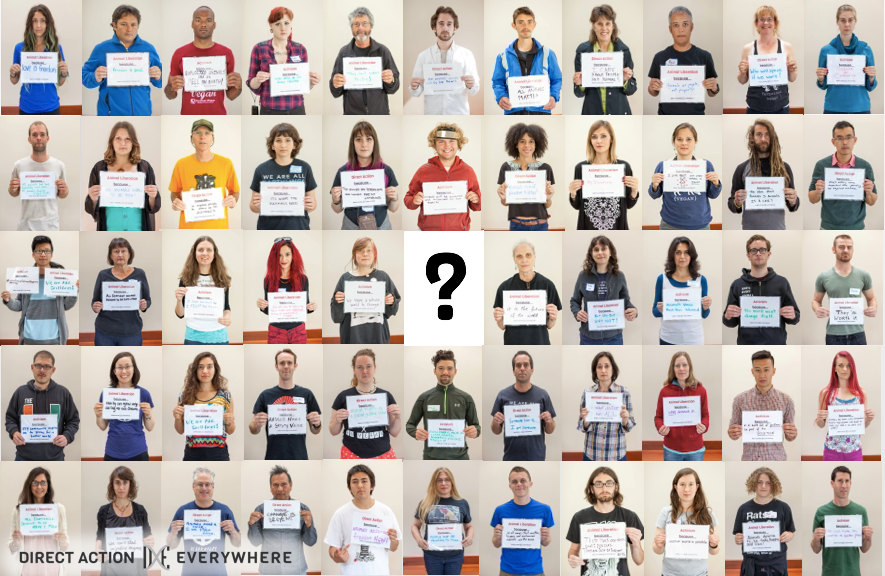[Image: A collage of people holding signs, with a question mark in the middle and the Direct Action Everywhere logo at the bottom.]
Edit, June 2016: Since publishing this post I have left Direct Action Everywhere (DxE), as have several others pictured in the above collage. My points about privilege and ranking oppression still stand.
A lot of people misunderstand the concept of privilege. White people and cis men in particular get very defensive when called out on speaking from a place of privilege. “I’m not privileged,” they cry, “I’m not [rich/straight/Christian/American/etc.]”
Here’s the thing. Privilege is not an on/off, yes/no switch. Nor is it something you can assess with an overall rank, despite what well-intentioned but misleading quiz memes might tell you. Privilege consists of many components, including but not limited to: Race, gender, sexual orientation, class, religion, physical and mental ability. Today’s article in Everyday Feminism addresses a lot of common misconceptions about this topic.
As a queer black trans atheist, I am a member of several oppressed groups. Despite this, I still enjoy many privileges. I am financially stable, college-educated, US-American, and English-speaking, for starters. I am also relatively able-bodied and slim.
But none of these privileges completely erase the disadvantages I have. My skin color makes me a greater target for police profiling and violence, independent of my class or education. Being a nonbinary trans person means that I experience social dysphoria on a daily basis, even though I have financial access to hormones that help with the physical dysphoria. Being queer means I face possible harassment and violence if I am affectionate with my male spouse in public, even though same-sex marriage is now legal in all fifty US states. And being an atheist means that I am in one of the most despised groups of all in this country, independent of anything else about me.
When it comes to privilege, I find it unhelpful to rank oppression. Many animal rights activists correctly point out that we all enjoy human privilege. But as I’ve argued in my post about veganism and white privilege, that in no way means that racism, sexism, or other human issues are trivial by comparison. Rather than telling women, people of color, and others in disadvantaged groups to stop “playing the victim” because they supposedly have it so much better than non-human animals, we should be recognizing and honoring their struggles alongside our fight to end speciesism.
We should all use what privileges we do have to amplify the voices of those who do not share our advantages. The montage at the top of this post shows some of my fellow animal liberationists from Direct Action Everywhere; I took these photos at our annual forum. As also seen in our most recent video (I can be seen briefly at approximately 3:13), we represent a wide variety of races, genders, and nationalities, in a movement that is dominated by cis white voices. We come together to speak for the non-human animals whose voices have been silenced. I will be joining my DxE friends in San Francisco this Saturday, as we light the path to liberation.

Where did you get the above image? I would love to be able to read some of those signs.
Here’s the page on the DxE site where you can zoom in on the individual images and learn more about the goals of each person pictured. (I linked to this page in the blog post, but it may not have been obvious.)